- Home
- Barry Unsworth
Morality Play
Morality Play Read online
Morality Play
Book Jacket
Tags: Historical Novel
It is the late-14th century, a time beset by war and plague. Nicholas Barber, a young cleric, abandons his post in the church and joins a troupe of travelling performers. The players re-enact the murder of a young boy, but as they rehearse they discover the truth has yet to be revealed
Morality Play
BARRY UNSWORTH
HAMISH HAMILTON · LONDON
For Aira, always
Published by the Penguin Group Penguin Books Ltd, 27 Wrights Lane, London v8 yn, England Penguin Books USA Inc., Hudson Street, New York, New York 10014, USA Penguin Books Australia Ltd, Ringwood, Victoria, Australia Penguin Books Canada Ltd, 10 Alcorn Avenue, Toronto, Ontario, Canada M4V 5B2 Penguin Books (NZ) Ltd, 182-190 Wairau Road, Auckland 10, New Zealand
Penguin Books Ltd, Registered Offices: Harmondsworth, Middlesex, England
First published 1995 5 7 9 10 8 6 4
Copyright © Barry Unsworth, 1995
The moral right of the author has been asserted
All rights reserved. Without limiting the rights under copyright reserved above, no part of this publication may be reproduced, stored in or introduced into a retrieval system, or transmitted, in any form or by any means (electronic, mechanical, photocopying, recording or otherwise), without the prior written permission of both the copyright owner and the above publisher of this book
Set in janson Monophoto Typeset by Datix International Ltd, Bungay, Suffolk Printed in Great Britain by Clays Ltd, St Ives plc
A CIP catalogue record for this book is available from the British Library
ISBN 0-241-13341-6
CHAPTER ONE
It was a death that began it all and another death that led us on. The first was of the man called
Brendan and I saw the moment of it. I saw them gather round and crouch over him in the bitter cold, then start back to give the soul passage. It was as if they played his death for me and this was a strange thing, as they did not know I watched, and I did not then know what they were.
Strange too that I should have been led to them, whether by angels or demons, at a time when my folly had brought me to such great need. I will not hide my sins, or what is the worth of absolution? That very day hunger had brought me to adultery and through adultery I had lost my cloak.
I am only a poor scholar, open-breeched to the winds of heaven as people say, with nothing but Latin to recommend me, but I am young and well favoured though short of stature, and women have looked at me sometimes. Such a thing had befallen not much before I saw Brendan die, though in this case, as I have said, it was not lust but hunger drove me, a lesser sin; I was hoping she would give me to eat, but she was too hasty and hot. Then by ill-luck the husband returned before expected and I had to escape through the cow-shed and left my good cloak behind in that bitter December weather. I was in fear of pursuit and broken bones, though it is forbidden to strike a man in Holy Orders, and so I was walking at the edge of the woodland and not on the open road. If I had kept to the road I would have passed by without seeing them.
There was a clearing, a place where a track led from the road into the wood. They had brought their cart here and I came upon them as they were taking the man down. I watched from among the trees without making it known. I was afraid to come forward. I thought they were robbers. They wore pieces of clothing that were strange and ill-assorted and seemed not to belong to them. These are dangerous times and a cleric is forbidden to bear weapons; all I had was a short stick. (Sticks, clubs and cudgels, being without point or cutting edge, naturally do not come under the ban.)
From my place in hiding I saw them bring him down from the cart, the gaunt, half-grown hound that was with them jumping up eagerly as if in play and showing his pale tongue. I glimpsed the man's face with the shine of death on it. They laid him down in the open. They had brought him there to be close to his death; I understood this also at the same moment. For who would wish to see a companion gasp his last on a jolting cart? We desire to keep the dying and the newly dead close before our eyes so as to give them full meed of pity. Our Lord was brought down to be pitied, on the Cross he was too far away.
They crouched around him in a circle, huddling close as if he was a fire to give warmth to them on this winter day, six persons, four men, a boy and a woman. They were dressed in cast-off scraps and pieces against all regulation of clothing for the people, one in a green hat with a plume to it such as the rich wear though he was poorly enough clad otherwise, another wore a white smock to the knees with his threadbare hose showing below, another - the boy -a lumpy shawl of what seemed horse-hair. The oaks beyond them had some russet still, last year's foliage dry on the stalk, and there was a gleam of light on it and on the coarse pelt of the boy's shawl.
The man was dying unshriven, there might have been time to hold out the Cross to him, but I was afraid to approach. Mea maxima culpa.
I could not see him now but I could hear across the space that separated us the struggle of his breath and I could see the mist of breath from the mouths of those above him. This was like incense, a fume of devotion. Then the sound ceased and I saw them shift back to make space for Death, a thing very wise to do, Death being less provoked when at large than when confined. It was like that scene in the Morality Play when the besieged soul flies free at last. It was then I saw that one of the men had a badge of livery, the emblem of a patron sewn to his cap.
It was then too that the dog found me out. This was a half-starved beast with every rib visible but it showed neither fawning nor cringing, merely an ignorant good-will. It had attempted more than once to break into the circle around the dead man and being repulsed had then gone snuffling at the edges of the clearing and so finally came upon me crouched behind my tree and fell to yapping, more it seemed in welcome than threat, and this brought one of the men, he of the green hat, a hulking ragged fellow with black hair tied behind and eyes black as damson, who drew a knife at the sight of me, and when I saw this I got to my feet with all haste and made the open-handed priestly gesture of gratitude for blessing - this so he should see at once what I was. 'Come forth and show your face,' he said.
At this I came forward promptly enough. 'I was walking through the trees,' I said. 'I came upon you by accident. I was unwilling to interrupt at such a moment.'
They had started up from the dead man, whose eyes were wide open and blue as a thrush's egg. He was bald and round-headed, with a blubbery face like a mask of lard and his mouth was crooked and hung open a little at the lower end. The cur took advantage of the diversion to lick at his face and this licking pulled the mouth more open. The boy kicked the dog and it yelped and went and pissed against a tree. 'A priest,' the boy said. It was not a shawl that he wore over his shoulders, but some sort of garment with trailing leg pieces. I saw now that he was weeping - his face was wet with tears.
'You might have gone back or taken another way,' the one with the badge in his cap said. 'You chose to spy.' The emblem was a white stork above crossed halberds. I knew this man for the leader because of the badge, also because he spoke for them all. He was some years older than I, of middling height, slender of body but wiry and quick. He alone had no borrowed clothes about him. He wore a jerkin of sheepskin with a short tunic below it much frayed at the neck. The muscles in his calves and thighs showed prominently through the thin stuff of his hose. 'You came too late even to do your office,' he said with contempt. 'Brendan died with his sins upon him while you were skulking there.' His face was a narrow oval, white now with grief or cold. The eyes were beautiful, grey-green in colour, set below slanting brows. Later I was to wonder why I saw no danger in this zealot's face of his, but my divining soul was lost in the fear of th
e moment. I am not brave and I had come upon them at the moment of a death. I was a stranger, in some manner I could be blamed. It is enough in these terrible times to put a man at risk of injury or worse. There is a passion of violence in the people; where several are gathered the spirit of murder is never far.
'I meant no harm,' I said. 'I am only a poor priest.' This last certainly was an unnecessary saying, they could see what I was from my habit and my tonsure. 'There is no one with me,' I said.
'A priest abroad on foot, a priest hiding among the trees,' another of them said, he of the white robe, and he laughed like a sob. 'He has been giving sermons to the little folk.' This was a young man, no more than twenty by his looks, with hair of wheat-colour, very ill-kept. His eyes were pale and unsteady and set wide in his face, and there was a full colour of blood in his lips. He had tears on his cheeks also. 'I meant no harm,' I said again.
'Put away the knife, Stephen,' the man who was the leader said to the dark man. 'Do you take a hammer to a beetle?' This scornful reference to my status as priest and dignity as man was wounding to me in my helpless state but I was still too afraid to reply. Stephen returned the knife to his belt with a flourish and bared his teeth at me as he did so and it seemed to me that he did this so as to seem less obedient. I saw now that he had no thumb on his right hand.
The piebald nag had ambled forward to the edge of the clearing and lowered its head to crop at the thin grass. The cart had a cover of oiled canvas but I could now see over the wooden flap at the back of it. It was heaped with a strange mixture of things, bundles of coloured stuff, robes and costumes, a gilt crown, the shape of a tree cut out and painted, also a serpent in coils and a devil's fork and a flaxen wig and a ladder. There were pots and pans there also and a brazier and tripod and a round metal tray a yard at least across.
One needed not to be so well versed as I in Occam's Law to find the minimum explanation for such diversity of effects: they were travelling players and they were wearing scraps of costume against the cold.
My fear lifted, no one fears players, but I felt the situation to be difficult. Having stumbled on a death I could not simply walk away. I began talking, which is my usual resource. I am copious in speech when I find a theme and my time disputing in the Schools has sharpened this fluency and taught me the figures of rhetoric. I explained to them that it had been the spirit of inquiry that kept me there watching and I went on to point out that this is no vice as the vulgar sometimes suppose, calling it curiosity; on the contrary the spirit of inquiry in a well-ordered soul springs from a sense of common humanity, and I quoted in support of this that saying of Publius Terentius Afer, ‘humani nil a me alienum.
There are times when we are blind to the ill-matching of things. I stood prating among them, with the dead man lying in our midst staring up at a sky that was darkening with snow. I would have gone on longer, warming to my theme, but I was interrupted by a snorting sound from the man called Stephen, and the boy clapped his hands. I was offended by this disrespect but then bethought me of the figure I must cut, with my threadbare cassock and rag-haired pate. I had been on the road since May and the hair had grown; I had tried to restore the tonsure with the razor I carry in my pack but made a botch of it, having to work by touch alone.
'Well, he can talk,' the woman said. This was a slattern with hair falling into her eyes, young still but with hardship like a mask on the face of her youth. Such faces we see often among the people now, not true faces but masked by sufferings. She wore over shoulders and chest a piece of stuff checked in red and white squares, a Fool's shoulder-cloth taken from the cart, with a hole in the middle, through which she had passed her head. 'Creeping about in the bushes, what did he hope to see?' And she raised the muddy hems of her skirts some inches and spread her knees and the gesture was slight but very lewd, a whore's gesture. Then the fair-haired staring one, who to me had the look of disordered nerves, made a mime of crouching and peering, gulping all the while with lecherous eagerness in his white angel's smock and it was very well done but no one spoke or laughed. They were in grief for the dead man, they had loved him. I was of no account to them because I had come through the trees like a thief, they knew me for a fugitive, outside the limits of my diocese without permission. Travelling players are wanderers also, but these had a badge of livery, they had the licence of a lord.
The one I knew for the leader knelt again by the body and drew the eyelids down and turned the face aside, very gently, with the flat of his hand against the cheek, so as to bring the flaccid lips together again, over the bloodless gums. 'Alas, poor man, poor Brendan,' he said. He looked briefly up at me. 'You came at a bad time,' he said in a tone without animosity. 'You came with his death. You will favour us now by going on your way.' But I did not move because with his words an idea had come to me. 'We shall have to put Brendan back on the cart,' he said, looking again towards the dead face.
'On the cart? To what end? Where should we take him?' This came brusquely from the man called Stephen. I saw the master-player swallow and some red of anger came to his face, but he did not speak immediately. 'Take yourself off while you still can walk,' Stephen said violently to me - the anger was in him also.
'Wait,' I said. 'Let me travel with you. I am not big but I am strong enough, I could help with the scaffolding and the boards when you put up a booth. I write a good hand, I could copy parts and prompt the players.'
Yes, the proposal came from me, the first idea, but I had no thought in the beginning of taking part in their plays, of practising their shameful trade, artem illam ignominiosam, forbidden to us by Holy Church. My only thought was to travel with them and this because of the badge the leader wore, which meant that the company belonged to a lord and had the lord's letter of licence and would not be set in the stocks or whipped for vagabonds as happens to those accounted fugitives or masterless men and this has also befallen men in Holy Orders who have no warrant from their Bishop. Also present to my mind was the wronged husband: if he came after me I would find safety in numbers. But I swear it was never in my thought to take the dead man's place. Had I but known the toils of evil this wayside death would lead us into, I would have gone my way with no further syllable and all the haste I could summon.
As yet there had been no answer, though I heard some laughter among them. 'I can hear confessions,' I said. 'I can expound the Scriptures. It is true I have no benefice and I am outside my diocese, but I can still perform the office. I would not ask for wages, only the food and lodging we chance on as we go.'
'Of your expounding we have no need,' the master-player said. 'No more than of your Latin. As for putting up a booth, men will come forward if help is needed and ask nothing but a quart of ale and a ha'p'orth of cheese and that is less expense than an extra belly to fill all along the road.'
But he was looking at me in a different way now, on his face had appeared an expression of considering. He had heard the need in my voice, fear too perhaps - a solitary man is prey to fear, unless the solitude be embraced for Christ. 'A priest can usually sing,' he said. 'Have you a voice for singing?'
'Why, yes,' I said, in some wonder - I did not see yet where he was coming to. And it was the truth, I have been commended for my voice. It is not of great strength but clear and sweet of tone. Along the way, when my money was all spent, I had used it sometimes for profane purposes; out of my need I had sung in taverns and sometimes I had been pelted, but more often fed and given space to sleep.
'Brendan was a marvel in song,' he said. 'He outdid the nightingale.'
'He would sing like an angel,' the flax-haired one said, with that strange, infirm eagerness of expression that belonged to him. 'He would plant his feet and raise his head; it was as if a tree sang with its leaves.'
'His song was like a rope of silk,' Stephen said. His voice was deep and had a drinker's hoarseness in it.
This was the first instance I noted of a habit common with them, of speaking with one voice like a chorus, but yet in turn, so it rese
mbled a scale in music. They had changed, they were sharing with me their knowledge of the dead man. But I could not easily think of sweet airs coming from the throat that was Brendan's now, nor of that poor crooked mouth moving with song. His face was turned to hog's lard in that cold weather. 'How did he come to his end?' I asked.
'Yesterday, walking behind the cart, on a sudden he cried out and fell down,' the fourth man said, speaking now for the first time. This one was older, scant-haired and long-jawed, with bright blue eyes. 'He could not get up, he had to be lifted,' he said.
'From that time he could not speak,' the boy said. 'He had to be taken on the cart.'
'Sounds he could make but no words,' the leader said. 'He was ready of speech before and full of jokes.' He glanced at me and there was a fleeting horror in this glance. I saw that for him the dumbness that had befallen Brendan, singer and joker, was a thing of nightmare. 'Sing something, you,' he bade me.
I should not have obeyed because he had something in mind for me not admissible and I suspected it by now. Playing on a public stage is forbidden to us by Council, first at Exeter and then at Chester, also by edict of our Father in Christ Boniface the Eighth, and so I knew I was placing myself in danger of degradation. But I was hungry and sick at heart.
'Do you want a love-song,' I said, 'or a song of good works?'
'A love-song, a love-song,' Stephen said. 'The Devil take good works.' He said this without smiling. In all the time I was with them I only once saw him smile.
'Good works he will not take, brother, but he will take the rash of speech,' the old one said. The dog sat close to him and listened to his every word. He clapped his hands at me. 'Come, sing,' he said.
So I gave them 'Lenten is come with love to town', singing alone in the clearing, unaccompanied at first, then the boy played the melody along with me on a reed pipe that he took from somewhere about him.
At the end of it the leader nodded his head. Then he turned and went to the cart and found there two rag balls such as jugglers use, one red, one white, and he called me to catch and flung the red one, speaking and throwing at the same moment almost, and I caught it in my right hand and he threw the white one to the other side, high this time and a little wide so I had to take two steps, and this second ball also I caught and held. Someone behind blocked my left heel while I was still off balance and I stumbled but I did not fall.

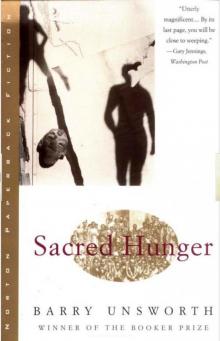 Sacred Hunger
Sacred Hunger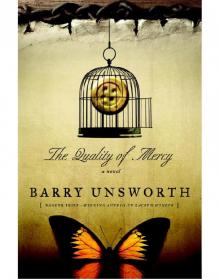 The Quality of Mercy: A Novel
The Quality of Mercy: A Novel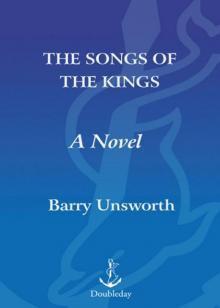 The Songs of the Kings: A Novel
The Songs of the Kings: A Novel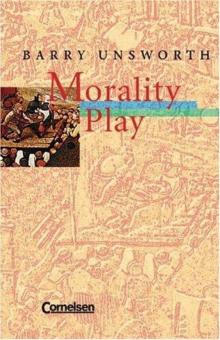 Morality Play. Mit Materialien. (Lernmaterialien)
Morality Play. Mit Materialien. (Lernmaterialien)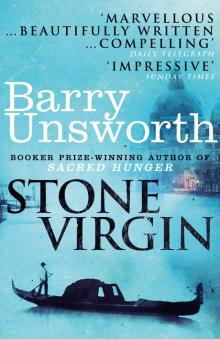 Stone Virgin
Stone Virgin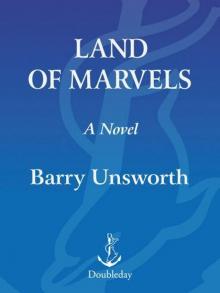 Land of Marvels
Land of Marvels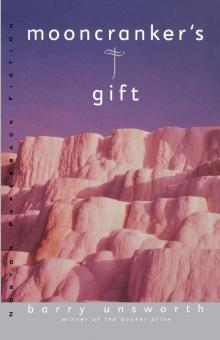 Mooncranker's Gift
Mooncranker's Gift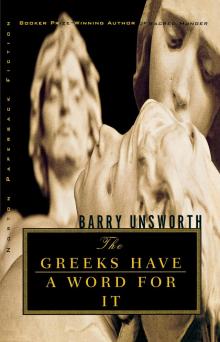 The Greeks Have a Word for It
The Greeks Have a Word for It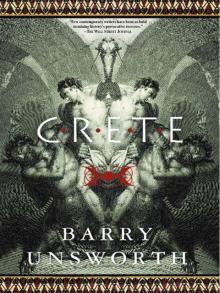 Crete
Crete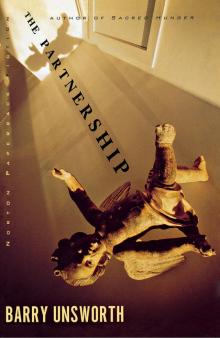 The Partnership
The Partnership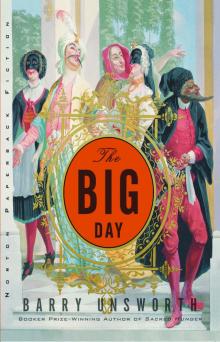 The Big Day
The Big Day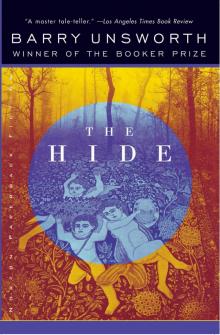 The Hide
The Hide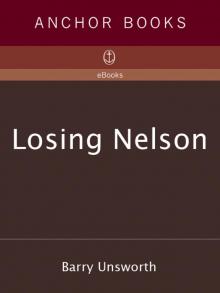 Losing Nelson
Losing Nelson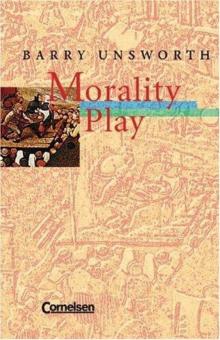 Morality Play
Morality Play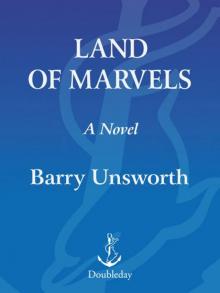 Land of Marvels: A Novel
Land of Marvels: A Novel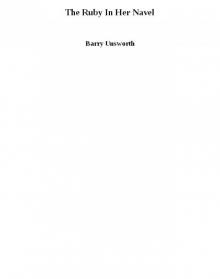 The Ruby In Her Navel
The Ruby In Her Navel